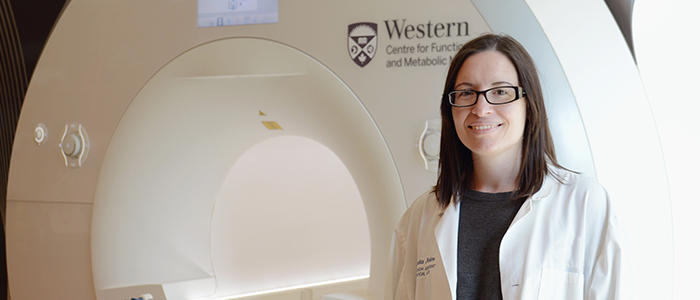Unlocking secrets of the unconscious brain
Angela McInnes, BA’15
There is no easy way to accurately predict the future of a patient who has fallen into a state of unconsciousness. Loretta Norton, MSc’10, PhD Candidate, hopes to change this with the use of functional magnetic resonance imaging (fMRI) technology.
Under the supervision of Adrian Owen, PhD, she works to improve the management of care for comatose patients.
“Dr. Owen’s work has focused on people who have been in a vegetative state and were thought to be completely unaware of what’s going on around them,” said Norton. “In his research, fMRI showed that patients with high level processing of auditory stimuli improved in the following six months.”
With the knowledge that fMRI can detect a patient’s external awareness after extended periods of unconsciousness, Norton’s research explores its efficacy on acute patients immediately after their abrupt entry into a coma due to an illness or trauma.
“If fMRI is useful for diagnosing patients who might make a meaningful recovery and patients who might not, we want to determine if that can be extended into the intensive care unit (ICU) where difficult discussions around life support are taking place,” Norton explained. “My research moves from chronic patients to acute patients to determine if fMRI findings are useful for the neurologists in helping them to make a prognosis.”
Originally from St. Catharines, Norton’s interest in the brain and behaviour led her to study neuroscience at Brock University. The young scientist took on a position as a research assistant to Drs. Bryan Young and Mike Sharpe during the fourth year of her undergraduate degree, and the experience influenced the direction of her career.
“As an undergraduate student, I worked in a clinical environment with a critically ill patient group while contributing to research in understanding and improving their medical care,” she said. “This shaped what I wanted to do in graduate school, and I knew Schulich Medicine & Dentistry was the place where I could continue to do that.”
The research Norton worked on during her master’s aligned perfectly with that of Owen’s. Now as a doctoral candidate in the Department of Neuroscience, Norton devotes herself to the continual exploration of disorders in consciousness. In June, she will be giving a talk on the subject at the Canadian Neurological Sciences Federation 2016 Congress, taking place in Québec City.
When it comes to collecting data, difficulties arise out of the transient nature of the acute patients, who may pass away or recover before they can go through the fMRI scanner. Other challenges stem from the severity of their condition, rendering them too unsafe to be moved.
Moving forward, Norton aspires to translate fMRI into a test that can be completed at the bedside. Although this test is still in its infancy, she is optimistic for the promise it holds.
“I love my work within the neurocritical care program and improving our prognostic measures used in ICU patients through my continued research,” Norton said. “If we can give our neurology team any additional tools to help care for these patients, that’s what gets me excited.”









